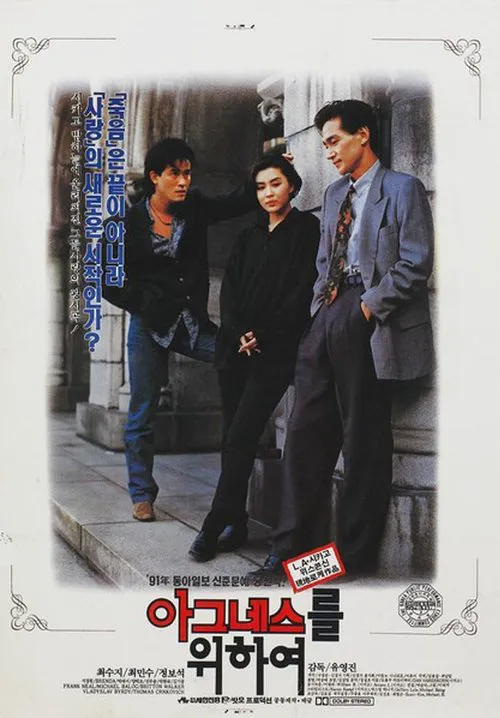For Agnes

Handlung
For Agnes is a 1996 South Korean television drama film directed by Lee Seon-kyeong and Lee Tae-won. The movie revolves around the life of Agnes, a wife and mother who finds herself on death row after being convicted of murdering her abusive husband. Throughout the film, Agnes's story serves as a commentary on the societal expectations placed on women in Korea, particularly the tolerance for domestic violence and the lack of support available for those in abusive relationships. Agnes's life begins to unravel as the story progresses, and her situation escalates as she suffers at the hands of her husband's abuse. Despite her desperate pleas for help, Agnes faces dismissal and indifference from the authorities, her family, and even her own friends. The relentless mistreatment at the hands of her husband, who represents the oppressive societal norms, slowly drives Agnes to the brink of madness. Her situation worsens, and her husband's abuse escalates, ultimately resulting in a gruesome event that lands Agnes on death row. As the narrative unfolds, the story delves deeper into Agnes's psyche, offering a poignant portrayal of the effects of trauma on a human being. The filmmakers' approach is unflinching and unromanticized, refusing to shy away from depicting the brutal realities of domestic abuse. Through the camera's lens, the viewer is immersed in Agnes's world, witness to the emotional turmoil and the crippling helplessness that permeate her existence. Throughout the film, Agnes's character undergoes significant development as she struggles to come to terms with her circumstances. Her initial desperation slowly gives way to acceptance, which eventually morphs into resilience. Despite the severe punishment she faces, Agnes manages to find a new lease on life, even as death looms large. One of the most compelling aspects of For Agnes is its ability to transcend the boundaries of genre, oscillating seamlessly between drama and social commentary. The film raises important questions about the value placed on women's lives and the way the justice system responds to their pleas for help. By shedding light on the often-overlooked realities of domestic violence, the film offers a searing critique of the societal norms that enable such atrocities to occur. For Agnes relies heavily on its protagonist's emotional journey, and the movie's emotional resonance is deeply connected to Bae Doona's captivating performance. The Korean actress brings depth and nuance to the character, imbuing Agnes with a relatable humanity that makes the audience invested in her fate. Bae Doona's portrayal of Agnes serves as a testament to her remarkable talent, one that is capable of conjuring up the complexity and depth required to bring the character to life. The cinematography in For Agnes is starkly beautiful, capturing the bleakness and desolation of Agnes's world. The visuals evoke a sense of desolation and isolation, underscoring the themes of loneliness and disconnection that permeate the film. The use of muted color palette, in particular, serves to emphasize the oppressive nature of Agnes's circumstances, further underscoring the bleakness of her reality. Ultimately, For Agnes is a thought-provoking and emotionally charged viewing experience that leaves a lasting impact on the viewer. The film serves as a powerful testimony to the need for change, a clarion call for a society that tolerates such egregious acts of violence against women. As a social commentary, For Agnes raises vital questions about justice, equality, and compassion, forcing its audience to confront the darker aspects of their own society.
Kritiken
Empfehlungen


